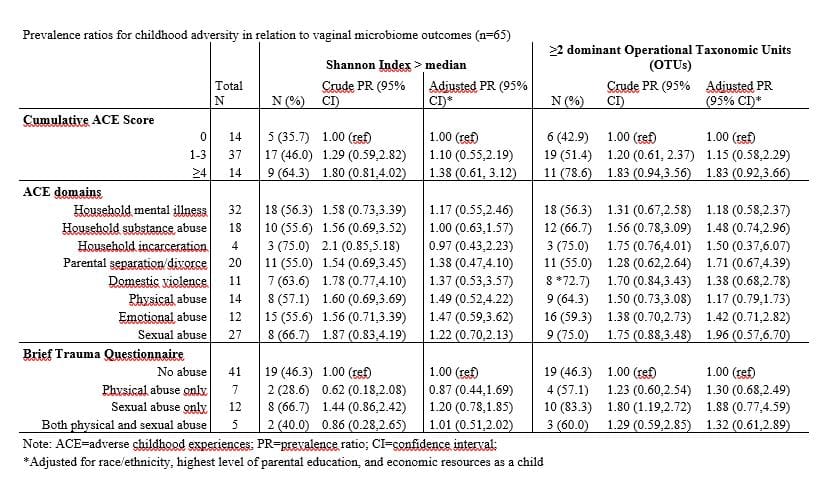Social
Childhood adversity and vaginal microbiome diversity among pregnancy planners Andrea S. Kuriyama* Andrea S Kuriyama Julia C Bond Eliza Pentz Bernard L. Harlow Wendy Kuohung Doyle Ward Yael Nillni Renee Boynton-Jarrett Lauren A. Wise
Introduction: Childhood adversity (CA) can have long-term health effects, including impaired immune function and dysregulated cortisol levels, both hypothesized to cause dysbiosis of the vaginal microbiome.
Methods: We estimated the association between CA and the vaginal microbiome among 65 participants in Pregnancy Study Online, a preconception cohort study. At baseline, participants reported CA via the Adverse Childhood Experiences (ACE) scale and Brief Trauma Questionnaire (BTQ). Participants provided a vaginal swab sample within two weeks of enrollment that was analyzed with 16S rDNA sequencing. Higher microbiome diversity (associated with dysbiosis) was operationalized as 2 binary variables: 1) higher than the sample median of the Shannon Index (a metric for diversity of microbes in a single sample) and 2) ≥2 dominant operational taxonomical units (OTUs) – groups of related organisms comprising ≥10% of the microbiome. We calculated prevalence ratios (PRs) and 95% confidence intervals (95% CIs) using log-binomial regression, adjusting for race/ethnicity, parental education, and childhood .
Results: ACE scores 1-3 and ≥4 (vs. 0) were positively associated with Shannon Index >median (PR=1.10, 95% CI=0.55-2.19; PR=1.38, 95% CI=0.61-3.12, respectively) and ≥2 dominant OTUs (PR=1.15, 95% CI=0.58-2.29; PR=1.83, 95% CI=0.92-3.66, respectively). All ACE domains were positively associated with Shannon index >median and ≥2 dominant OTUs, except for household substance abuse and incarceration. Compared with participants who reported no abuse on the BTQ, those who reported sexual abuse only were more likely to have a Shannon Index > median. Across all BTQ categories, those reporting abuse were more likely to have ≥2 dominant OTUs than those reporting no abuse.
Conclusions: CA was associated with greater vaginal microbiome diversity, indicating that CA may have long-term effects on reproductive health.

